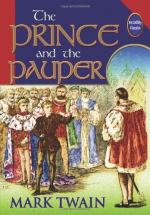“A beggar and a thief! He has got your money and has picked your pocket likewise. An’ thou would’st do a healing miracle, lay thy staff over his shoulders and trust Providence for the rest.”
But Hugo did not tarry for the miracle. In a moment he was up and off like the wind, the gentleman following after and raising the hue and cry lustily as he went. The King, breathing deep gratitude to Heaven for his own release, fled in the opposite direction, and did not slacken his pace until he was out of harm’s reach. He took the first road that offered, and soon put the village behind him. He hurried along, as briskly as he could, during several hours, keeping a nervous watch over his shoulder for pursuit; but his fears left him at last, and a grateful sense of security took their place. He recognised, now, that he was hungry, and also very tired. So he halted at a farmhouse; but when he was about to speak, he was cut short and driven rudely away. His clothes were against him.
He wandered on, wounded and indignant, and was resolved to put himself in the way of like treatment no more. But hunger is pride’s master; so, as the evening drew near, he made an attempt at another farmhouse; but here he fared worse than before; for he was called hard names and was promised arrest as a vagrant except he moved on promptly.
The night came on, chilly and overcast; and still the footsore monarch laboured slowly on. He was obliged to keep moving, for every time he sat down to rest he was soon penetrated to the bone with the cold. All his sensations and experiences, as he moved through the solemn gloom and the empty vastness of the night, were new and strange to him. At intervals he heard voices approach, pass by, and fade into silence; and as he saw nothing more of the bodies they belonged to than a sort of formless drifting blur, there was something spectral and uncanny about it all that made him shudder. Occasionally he caught the twinkle of a light—always far away, apparently—almost in another world; if he heard the tinkle of a sheep’s bell, it was vague, distant, indistinct; the muffled lowing of the herds floated to him on the night wind in vanishing cadences, a mournful sound; now and then came the complaining howl of a dog over viewless expanses of field and forest; all sounds were remote; they made the little King feel that all life and activity were far removed from him, and that he stood solitary, companionless, in the centre of a measureless solitude.
He stumbled along, through the gruesome fascinations of this new experience, startled occasionally by the soft rustling of the dry leaves overhead, so like human whispers they seemed to sound; and by-and-by he came suddenly upon the freckled light of a tin lantern near at hand. He stepped back into the shadows and waited. The lantern stood by the open door of a barn. The King waited some time—there was no sound, and nobody stirring. He got so




